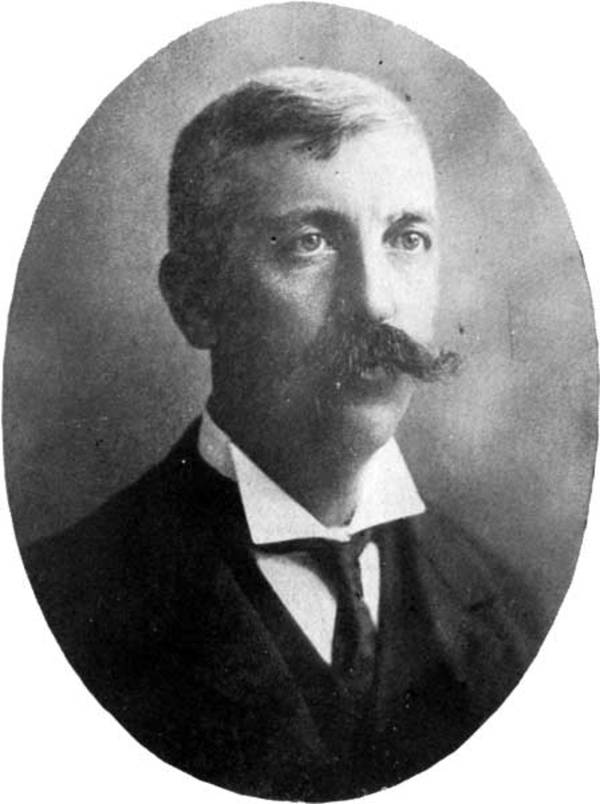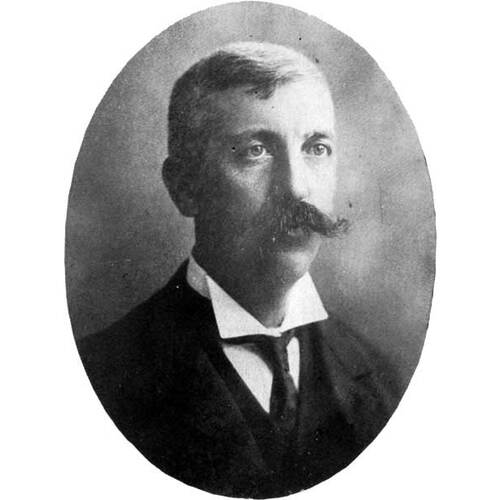
Source: Link
HUTCHINGS, ELISHA FREDERICK, harness maker, businessman, and politician; b. 13 June 1855 in Newboro, Upper Canada, son of Elijah Hutchings and Harriet Gifford; m. 3 Oct. 1882 Sarah Ann Denby of Newboro, and they had three daughters and two sons; d. 14 April 1930 in Winnipeg.
The son of a farmer, Elisha Hutchings attended the country schools of Leeds County, Upper Canada, until age 15 when he was apprenticed to a harness maker. After completing his training in 1873, he plied his trade as a journeyman for three years before seeking his fortune in western Canada. Unimpressed with Winnipeg and short of cash, he was attracted to Edmonton by rumours of gold strikes. There he found occasional work at his trade and supplemented it with hunting and trapping. In the spring of 1877 he returned to Winnipeg.
Hutchings had planned to go into business, but the theft of his money and clothing forced him to take wage labour once again. He studied briefly at night at Alexander Begg*’s short-lived Manitoba Commercial College. He worked on his own account as a harness maker for a short time in 1878, but in 1879 he bought a junior partnership in Richard Stalker’s harness-making business. By 1881 the firm had a retail and wholesale operation in Winnipeg under Hutchings’s direction and a retail branch in Portage la Prairie under Stalker. It possessed capital of between $10,000 and $20,000. When Stalker died three years later, Hutchings purchased his interest.
Hutchings made brief incursions into municipal politics. He served two two-year terms as alderman, 1887–88 and 1894–95. As well, he ran unsuccessfully for mayor in 1900. Meanwhile, his business flourished with the settlement and growth of western Canada. In 1891 Dun, Wiman and Company reported its worth at between $75,000 and $125,000. By 1899 the extent of his investment had persuaded Hutchings to incorporate as the Great West Saddlery Company. The firm manufactured harnesses, saddles, trunks, and bags in Winnipeg and Calgary and ran a wholesale business in harness, saddlery, and hardware. As well, the company operated ten retail stores throughout the west and developed a significant export trade to South Africa, Australia, and New Zealand. By 1911 its assets were estimated at $750,000 to $1,000,000 and Hutchings himself was reputed to be worth $2,000,000, including his investments in several insurance and loan companies and building materials firms.
A major employer in Winnipeg, Hutchings had about 150 men by 1911. He actively recruited skilled workers in England. Disgruntled former employees disputed his claims of job opportunities and wrote home that his real goal was to depress wages and weaken organization among his workers. Hutchings routinely fired union men. In October 1911 he locked out ten employees who refused to sign a contract pledging not to start a union and not to belong to any association that supported strikes or promoted organization in his or any other business. When another 14 were fired for attending a protest meeting, the dismissed workers formed the Leather Workers’ Union and declared a strike against Great West Saddlery. Early in December the company laid off workers in Calgary who refused to sign its employment contract. The labour disputes attracted attention in Winnipeg, where class lines were beginning to harden. The Voice (Winnipeg) condemned Hutchings for duping uninformed “foreign-speaking” workers into signing the contract. The Trades and Labor Council supported the strike, as did several local unions, which contributed strike funds.
The most controversial reaction came from Winnipeg’s Ministerial Association. At the request of several employees, the association appointed a committee in October 1911 to investigate the dispute. Its report, issued the following month, emphasized that wages and factory conditions were not issues, but that the right of organization was. In response to the report, the reverends Charles William Gordon*, Salem Goldworth Bland*, and Fred Cook moved that the association condemn Hutchings for discriminating against union men. Although the Reverend James Shaver Woodsworth*, a member of the committee, argued for the adoption of a stronger resolution against the open shop, the majority favoured moderate censure. Even this resolution created a breach, since the Reverend David Christie of Westminster Presbyterian Church, where Hutchings was an office holder, resigned from the association. Pressure from the clergy did not move Hutchings and both the strike and the union collapsed.
In 1917 Hutchings again achieved national notoriety, this time for his attempts to seek an exemption from military service for his son Harold Gifford. His son, he argued before the appeal judge, was crucial to his plant’s operations. Besides, he said, “I helped to build up this country not like some of these little one-horse men,” and having established a successful business, “I want to hand it over to my son to keep.” Hutchings claimed to be planning a shipbuilding operation in Vancouver and to be intending to leave the saddlery business under his son’s management. It was charged that he had attempted to use his wealth in his son’s cause and had declined to contribute to the Victory Loan unless exemption was granted. Hutchings denied these stories and won an apology, though witnesses testified to the Victory Loan incident before the appeal judge. Former employees, now in the military, denied that Harold played a significant role in the plant’s operation. The exemption was rejected.
The Great West Saddlery continued as a family business. Hutchings sold his interest in 1928, but remained active as president of the Equitable Trust Company and the Canada Loan and Mortgage Corporation. In the summer of 1929 he experienced heart difficulties, which caused his death the following April.
Shortly after his son’s hearing, Hutchings was denounced by the Manitoba Free Press for the “ignorant arrogance of his purse-proud blatantly materialistic soul.” In his business and in his public dealings, Hutchings claimed authority and privileges on the basis of his success and his wealth. In the extreme, his example attested to the growing social tensions in the city of Winnipeg.
Elisha Frederick Hutchings is the author of “Winnipeg’s increase of manufactured products in 1912 has been over fifty per cent,” Dominion Magazine (Toronto) (December 1912): 27–28.
AO, RG 80-5-0-108, no.6061. GA, M 1469–71, PA 234, PA 330. NA, RG 27, vol.299, no.3420. Gazette (Montreal), 5 Dec. 1917. Manitoba Free Press, 2 Aug. 1894; 22 Nov., 14–15, 17 Dec. 1917. Saturday Post (Winnipeg), 4 Nov. 1911. Voice (Winnipeg), 4, 11 March 1904; 13, 20, 27 Oct., 3, 10 Nov. 1911. Winnipeg Telegram, 29 Jan. 1910. Winnipeg Tribune, 22 June 1896, 14 April 1930. D. J. Bercuson, Confrontation at Winnipeg: labour, industrial relations, and the general strike (Montreal and London, 1974). George Bryce, A history of Manitoba; its resources and people (Toronto and Montreal, 1906). Canadian album (Cochrane and Hopkins), 3: 182. The mercantile agency reference book . . . (Montreal), 1901, 1911. Winnipeg, Manitoba, and her industries (Chicago and Winnipeg, 1882).
Cite This Article
David G. Burley, “HUTCHINGS, ELISHA FREDERICK,” in Dictionary of Canadian Biography, vol. 15, University of Toronto/Université Laval, 2003–, accessed January 1, 2026, https://www.biographi.ca/en/bio/hutchings_elisha_frederick_15E.html.
The citation above shows the format for footnotes and endnotes according to the Chicago manual of style (16th edition). Information to be used in other citation formats:
| Permalink: | https://www.biographi.ca/en/bio/hutchings_elisha_frederick_15E.html |
| Author of Article: | David G. Burley |
| Title of Article: | HUTCHINGS, ELISHA FREDERICK |
| Publication Name: | Dictionary of Canadian Biography, vol. 15 |
| Publisher: | University of Toronto/Université Laval |
| Year of publication: | 2005 |
| Year of revision: | 2005 |
| Access Date: | January 1, 2026 |



